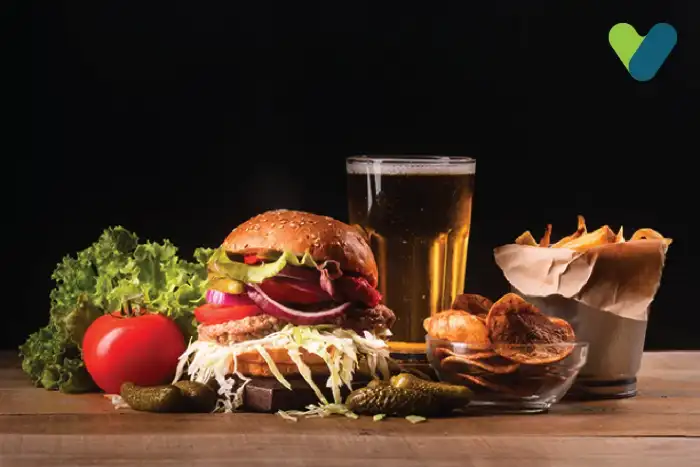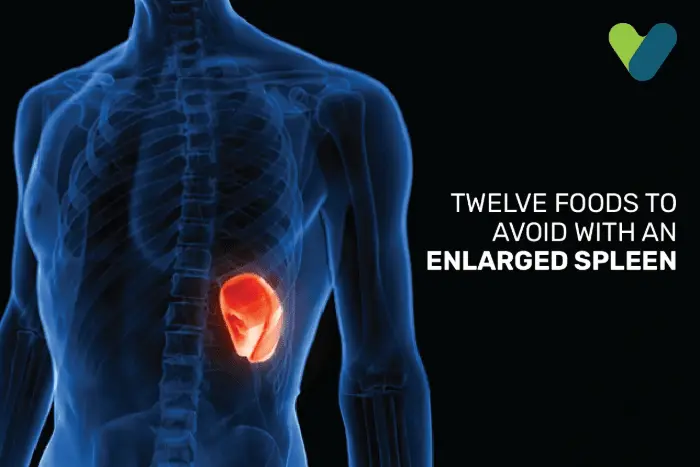The spleen is an organ that is present in the upper left abdomen of our body. It is a pivotal organ of our lymphatic system that plays plenty of tasks, including regulating the red blood cells, storing white blood cells, and safeguarding the proper storage of platelets. All these functions help our immune system to respond appropriately in the case of an injury/disease. Under certain circumstances (infections and diseases), the spleen becomes enlarged in weight or size, this condition is called splenomegaly. Although there hasn’t been much research on the subject, there is no specific enlarged spleen diet as such, but certain changes to your daily dietary habits may be helpful if you are suffering from an enlarged spleen (splenomegaly) or if you wish to steer clear of medical concerns associated with the condition.Further, in case of any complications one must consult a doctor to get treatment or medications to avoid enlarged spleen. In this article, we are going to mention how your diet will increase/decrease your risk of an enlarged spleen. We will also discuss what foods to avoid with an enlarged spleen.
What Is Splenomegaly / Enlarged Spleen?
The weight of a healthy spleen is around 0.15–0.44 pounds (70–200 grams).A weight of 0. 88–1. 1 pounds (400–500 grams) is referred to as splenomegaly. If the weight of your spleen is more than 2.2 pounds (1 kg), it is called massive splenomegaly. Splenomegaly may be an acute or prolonged condition. Due to infection or trauma, your spleen may become temporarily enlarged, with chronic diseases like cancer that can lead to a prolonged enlarged spleen.
Enlarged Spleen / Splenomegaly Causes
Some causes of an enlarged spleen are- Trauma
- Heart failure
- Certain cancers
- Infections like mononucleosis
- Autoimmune diseases like lupus and rheumatoid arthritis
- Abscesses
Splenomegaly / Enlarged Spleen Symptoms
- Abdominal pain
- Bloating
- Bleeding easily
- Feeling fullness regardless of eating or after a modest amount of food since your spleen presses on your stomach
- Fever
- Frequent infections
- Anaemia (low red blood cell count)
How Diet Affects Spleen Health
The foods that you are consuming will give you energy, build and repair cells, and more. Your dietary choices can influence every organ of your body, including your spleen.A diet that contains ultra-processed foods like fast food, soda, and packaged snack foods will enhance the risk of conditions related to an enlarged spleen, such as non-alcoholic fatty liver disease NAFLD or obesity. On the other hand, if you follow a nutrient-rich diet like vegetables and fruits will minimize your chance of developing RA, NAFLD, and other conditions.

12 Foods to Avoid with Enlarged Spleen
Despite these big lists of foods to avoid spleen problems, still, there are some foods that you can eat even with spleen trouble.1. Sugary Foods
2. Alcohol
Drinking alcohol will aggravate your enlarged spleen condition. Excessive alcohol may cause your blood cell level to go low, and thus, inhibits the function of the spleen. You may also suffer from a disease called anemia. To ease the symptoms of an enlarged spleen, you must avoid or restrict your alcohol consumption.3. Caffeine
Tea and coffee possess antioxidants that are used to lessen inflammation. But if you consume too much coffee, this can affect your sleeping patterns, and as a result, your inflammation will also increase. Several studies have claimed that consuming coffee with a weak spleen may irritate your system.4. Diet Sodas
Sodas contain ingredients like artificial colors and sweeteners called saccharin and aspartame. These are not healthy for your immune system. Rather than drinking carbonated beverages, you should drink water to quench your thirst.5. Processed Oils
If you prepare your foods with refined oils, then this will enhance the production of free radicals in the body. These free radicals will damage your tissues and may cause inflammation. Thus, your immune system gets exposed to various diseases and infections. Thus, natural oils are recommended as they contain a higher amount of omega-3 fatty acids and vitamins.6. Fast Foods
If you want to lessen the symptoms of your enlarged spleen, then you should stay away from all types of fast foods. Fast foods are not healthy for your immune system because they contain a lot of salt. Excessive salt consumption may result in immune deficiencies.7. Cold Foods
If you are suffering from enlarged spleen problems, avoid cold and raw food items. Discard those food items that are stored in your refrigerator, as your body may not digest them. Since you can’t consume large meals, you prefer those foods that can be easily digested. Don’t eat raw vegetables and green salads as they come up with higher water content that will enhance your swelling.8. Cooked Vegetables
You can easily digest properly cooked vegetables even with an enlarged spleen. Such vegetables are parsnip, pumpkin, turnip, winter squash, and carrot. You can also consume legumes like peas, black beans, and garbanzo to your diet. Green vegetables that contain higher Vitamin A are great for your immune system function.9. Food Rich in Zinc
Zinc will minimize your inflammation and assuage stress. Some zinc-rich food items that you can incorporate into your diet are crab, lobster, oysters, clams, and mussels.10. Seeds and Nuts
Try to consume nuts and seeds like hazelnuts, walnuts, pistachios, sesame, flax, chia, pumpkin, and peanuts.11. Immune Booster Foods
Add citrus fruits that are rich in vitamin C to your diet. These fruits support and boost your immune system. You can take fruits like acai berry, figs, dates, apples, red grapes, apricots, plums, watermelon, and peach.12. Spices
You can prepare your food by adding spices like ginger, nutmeg, aniseed, rosemary, cinnamon, vanilla, garlic, turmeric, molasses, capsicum, and fennel.Other foods to avoid with an enlarged spleen are red meat, packaged cookies, dairy products, white bread, shellfish, and so on.
Splenomegaly / Enlarged Spleen - What To Do?
- High-fat, high-sugar diet induces splenomegaly that is ameliorated with exercise and genistein treatment. National Library of Medicine. https://ncbi.nlm.nih.gov/pmc/articles/PMC6198361/ .Accessed April 16, 2023.
- Enlarged Spleen. MSD Manual[Internet]. https://www.msdmanuals.com/en-in/home/blood-disorders/spleen-disorders/enlarged-spleen .Accessed April 17, 2023.
- Enlarged spleen (splenomegaly). University of Michigan Health - Sparrow [Internet]. https://www.uofmhealthsparrow.org/departments-conditions/conditions/enlarged-spleen-splenomegaly .Accessed April 17, 2023.
- Enlarged Spleen (Splenomegaly). News Medical Lifesciences News-Medical.Net[Internet]. https://www.news-medical.net/health/Enlarged-Spleen-(Splenomegaly).aspx .Accessed April 19, 2023.


